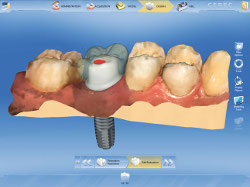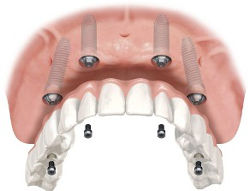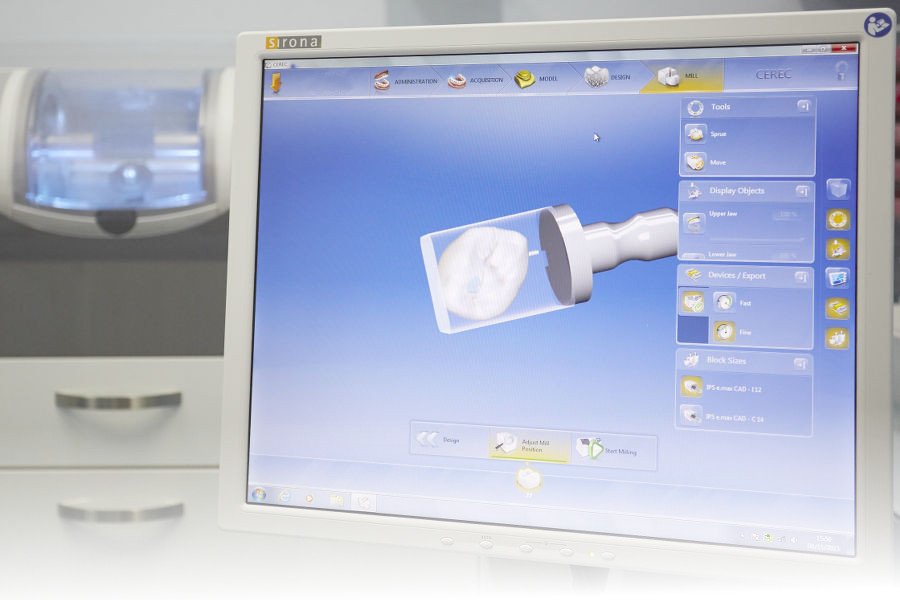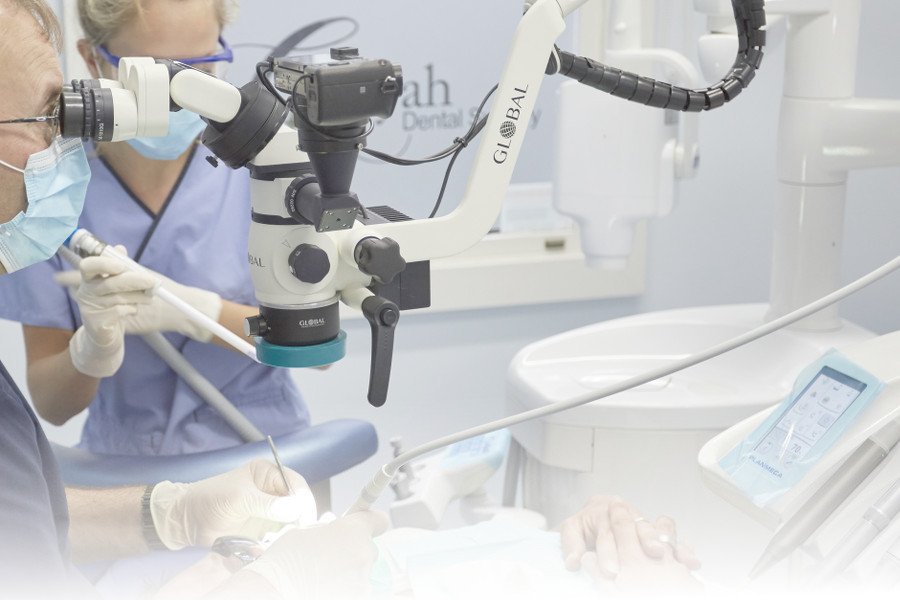Dental implants
Anyone missing one or more teeth understands how tooth loss can make you feel uncomfortable about smiling or eating in public. You may avoid social situations and as a result begin to feel isolated. This could impact on your daily life and your self-confidence.
Current dental implant treatments can change your life and are the new standard of care for tooth replacement. They bond with healthy bone and provide permanent support for dental crowns and dentures. Dental implants look and feel like natural teeth and can last a lifetime. From a single missing tooth to an entire set of teeth, dental implants restore your appearance, speech, nutrition, oral health, comfort, and self-esteem.
Successful implant dentistry requires expertise in planning, surgery and tooth restoration; it is as much about art and experience as it is about science. Gunyah Dental provides state-of-the-art equipment and facilities for the provision of dental implants and our team of highly qualified and experienced dental professionals guarantee a high level of expertise in this exciting and fulfilling area of dentistry.
What is a dental implant?

A dental implant can be thought of as an artificial tooth root that is submerged into the jawbone. When dental work such as a crown, fixed bridge or a full set of dentures is added, one or more missing teeth can be replaced. A dental implant is fabricated from a very strong, biocompatible material placed in a simple procedure that, generally, is as convenient as a tooth extraction. After an initial healing period, during which the implant is buried in bone and left undisturbed under gum tissue, it is uncovered and connected to a small metal post that secures and supports the artificial tooth.The implant material is extremely biocompatible. The bone grows to the implant and bonds to it. This makes the implant very strong. The process is called 'osseointegration'.
Why choose a dental implant?

Dental implants are widely considered to be the most successful method of tooth replacement used today, because they offer a number of important benefits to patients:
- Improved Self Esteem. A dental implant can do wonders for self-esteem, because it feels and looks like a normal tooth. Many people who were shy about smiling because of a space from a lost tooth feel more comfortable after a dental implant. Beyond the aesthetics, a dental implant also makes it easier to eat and speak, because a titanium post secured directly in the jaw holds the implant in place.
- Improved Appearance. Implants help retain healthy jaw bone and teeth make your face look younger. Leaving empty spaces in your mouth after losing one or more teeth can lead to additional health issues, such as the loss and deterioration of some of your jawbone. When it is not being used to support a natural tooth, the jawbone deteriorates, losing its strength and firmness. Dental implants are the only dental restoration option that preserves and stimulates natural bone to slow or prevent further bone loss. Retaining sufficient amounts of jaw bone, and having a full set of teeth supporting your lips from the inside, can give you a more youthful appearance and help retain your natural face shape.
- Improved Comfort. Dental implants eliminate the pain and discomfort of removable full or partial dentures. Since dentures sit on top of the jawbone and gums, continuous shrinkage of the jaw bone alters the fit of the denture resulting in slipping or rocking of the dentures. Exposed nerves and irritation of the gum tissue may add to the discomfort.
- Improved Confidence. Loose dentures can be a thing of the past when implants are used to support and stabilize overdentures. Conventional dentures may slip when you eat, talk, smile, laugh, kiss, yawn or cough, so that you have to “reposition” them back into place in the mouth. Dental implants can be fixed in place and used to secure your denture in place so that it won’t move, click or shift. You will eliminate the use of gooey denture adhesives that must be re-applied throughout the day.
- Eat Better. The average denture patient with an excellent fitting denture eats at 15-20% efficiency when compared to a person with natural teeth. As the jawbone shrinks, your chewing efficiency is reduced even more, making it difficult to eat certain foods. Dental implants can restore chewing efficiency comparable to that of natural teeth. This allows you to eat your favorite foods with confidence and without pain, enjoy what everyone is eating and not think twice about it. A full upper denture covers the palate of the mouth and reduces the ability to taste foods. With dental implants, you can have the palate removed from your upper denture so you can taste and enjoy your food.
- Protect Your Remaining Teeth. Choosing to have a dental implant can protect your healthy teeth. Placing a traditional tooth-supported bridge requires grinding away the teeth on one or both sides of the missing tooth or teeth – thereby damaging healthy teeth to restore those that are missing. The modified healthy teeth are attached to, and support, the bridge. Dental implants are placed in the spot where your missing tooth root was, without impacting healthy teeth. They also help prevent healthy, adjacent teeth from shifting as they would if an empty space were left for an extended period of time.
- Long Lasting. Dental implants are a long-lasting and proven solution. They are very durable and with proper care and good oral hygiene, implants will last for many years or even a lifetime. Dental implant treatment is often considered “more predictable” than other treatments to repair or replace missing teeth, including bridgework, removable appliances and retreatment of failing root canal (endodontic) therapy.
- Cost-effective. Implant treatment can be considered a long-term investment into your health and your wellbeing - in short, an investment into your life. Compared to other restorations, costs can seem higher at first glance but when one evaluates the return for the investment and the long range benefits that come from having secure, functional, attractive teeth and a winning smile dental implants can be considered a very cost effective treatment. It is also important to factor in the additional potential expenses following on from alternative treatment options such as higher maintenance costs, the potential increase in lost jaw bone and, ultimately, the loss of even more teeth which can make other restorations more expensive in the long run.
Are dental implants right for you?
If you’re missing one or more teeth, probably so! Nearly anyone in good health whose jaw has finished growing is a candidate, whether they were simply born without a tooth or lost one or more teeth due to injury, decay, gum (periodontal) disease, infection or another reason. Dental implants also are a great option for patients who don’t want the drawbacks of, or can no longer wear, removable dentures and bridges.
The best way to determine if you are a suitable candidate is to visit Gunyah Dental for an implant consultation.
An overview of our implant assessment process...
Step 1 – We offer you a consultation to discuss implants with Tony Appleton. If Tony considers you may be a suitable case for implants and you are keen to explore the options further, we will arrange an appointment so that a full assessment can be carried out. You will be given additional information to take away and Tony will be delighted to answer any further questions you may have.
Step 2 – A detailed assessment is carried out. As with other areas of dentistry, successful dental implant treatment relies on a rigorous and systematic approach to treatment planning. This assessment may include all or a combination of the following:

- Medical and dental history
- Assessment of dental and periodontal health
- digital intra-oral x-rays
- A sectional or full arch scan as appropriate using modern cone beam CT
- Analysis with Cerec software to allow a realistic three-dimensional plan of implant and restorative component positions. This will allow the relationship between the final desired tooth positions and of the existing underlying bone to be visualised in three dimensions.
- the manufacture of a surgical guide manufactured from this plan
- clinical photographs
- screening
- digital scans and preparation of two sets of models of your teeth.
Armed with all the necessary information your case will then be carefully considered by our implant team.
Step 3 – We will produce a report detailing your treatment options and a quotation for your consideration. We will present the treatment plan together with further information about implants and encourage you to ask any questions that you may have. If you decide to proceed with treatment and are fully satisfied with your treatment choice, we will ask you to read and sign a consent form. We offer all of our implant patients a 5% discount for pre-payment.
Single Tooth Replacement

If you are missing a single tooth, one implant and a crown can replace it. A dental implant replaces both the lost natural tooth and its root.
What are the advantages of a single-tooth implant over a bridge?
In addition to looking and functioning like a natural tooth, a dental implant replaces a single tooth without sacrificing the health of neighbouring teeth. The other common treatment for the loss of a single tooth, a tooth-supported fixed bridge, requires that adjacent teeth be ground down to support the cemented bridge.
With a bridge, some of the bone that previously surrounded the missing tooth begins to resorb (deteriorate) but a dental implant will integrate with your jawbone, helping to keep the bone healthy and intact.
In the long term, a single implant can be more aesthetic and easier to keep clean than a bridge. Gums can recede around a bridge, and in the case of a porcelain bonded to precious metal bridge can leave a visible and unsightly defect when the metal base or collar of the bridge becomes exposed. Resorbed bone beneath the bridge can lead to an unattractive smile. And, the cement holding the bridge in place can wash out, allowing bacteria to decay the teeth that anchor the bridge.
How will my new tooth feel?
You have little sensation from a dental implant, so you'll never have the sensitivity to hot and cold drinks or food like you would normally feel with regular teeth since there are no nerves. You cannot “feel” them in your bone and they look and chew just like a natural tooth. They look so natural you may well forget that you ever lost a tooth.
Multiple teeth replacement
If you are missing several teeth, implant-supported bridges or dentures can replace them. Dental implants will replace both your lost natural teeth and some of the roots.
If all your teeth are missing or failing, you are not destined to live with bulky, uncomfortable dentures for the rest of your life. The good news is dental implants can restore your teeth to almost natural condition. With great technological advances in the field of implant dentistry, you are now able to have teeth that look, feel, and function just as natural teeth.
Removable implant-supported overdenture

This option is ideal if you have dentures that are loose and unstable. With as few as 2 or 4 implants in each arch, your dentures become stable and supported, significantly improving the chewing function and eliminating slipping. With 2-4 dental implants on the upper arch, the palate portion of the upper denture can be eliminated improving both your palatal soft tissue health and your taste sensation. Quite often it is possible to place dental implants and convert your existing dentures to an overdenture.
The overdenture can be removed for cleaning and maintenance. Your dentist will attach a supporting structure to the implants so that you can snap your overdentures into place for increased stability and comfort while eating, drinking, and speaking.
Fixed implant supported ceramic bridges

Ceramic bridges, supported by dental implants, look, feel, and function like natural teeth. They can be provided to replace a few teeth or a full set of teeth. They are made from ceramic bonded to titanium framework. It is quite often possible to place temporary bridges immediately after dental implants are placed. The permanent ceramic bridge is placed 3-4 months later and will be only be removable by your dentist.
Fixed implant supported acrylic bridges
Implant supported bridges can also be made from acrylic bonded to a titanium framework.
The type of bridge selected depends on your “bite”, how much force will be generated, the position of the implants and your desired aesthetics. These bridges are custom made for each patient and no two are alike.
Dental Implants FAQ
Am I too old for dental implants?
No. Any person at any age can have dental implants as long as there is enough bone available in which to place the dental implants. If there is not enough bone, extra bone can often be grafted.
Would I need to do anything prior to treatment?
Yes. As part of our consultation we will screen your gums and bone for any infections. Prior to implant placement your remaining teeth and gums need to be healthy. We will offer any additional treatment to ensure that your mouth is healthy prior having implants.
What if I am nervous about treatment?
Some of our patients prefer to have the dental implants placed under sedation. A sedative can be carefully administered to relax you during the treatment, and ensure that you remember nothing about it afterwards.
What is the procedure for placing an implant?
Here are the key stages involved in placing a single dental implant:
Step 1.
First the extracted tooth is allowed to heal. This is vitally important to allow new bone to form in the hole left by the extracted tooth. During this time a temporary tooth is usually inserted so that no gap will be visible.
Step 2.
Next the implant is placed under local anaesthetic or sedation. This procedure is performed by the implant team at Gunyah Dental and may take as little as 30 – 60 minutes depending on the location and number of implants placed. The implant is left for a few weeks to heal. During this time a temporary tooth is usually re-inserted.
Step 3.
Next a titanium post is screwed into the implant. The titanium will fuse with the bone in the mouth, providing a strong, stable and long-lasting platform for the tooth to be fixed upon.
Step 4.
The crown is then inserted on top of the post. The restoration is custom made by hand to match in with your own teeth, so that your implant will be indistinguishable from a natural tooth. The smile is now complete, and the implant will function just as a normal tooth.

Before, after implant placement and after crown cementation
Is dental implant surgery painful?
We work closely with our patients to ensure that they feel no discomfort during the placement of the dental implant. This is achieved through the use of an effective local anaesthetic. Post-operatively we supply painkillers to ensure that our patients remain comfortable. We also offer sedation if you want to know nothing about your treatment.
How long does the treatment take?
For routine cases treatment time is usually ten weeks. More complex cases can take longer. For instance, when there is sufficient bone, treatment time is shortened and when there is insufficient bone, treatment time can be increased. Your specific treatment schedule will be explained to you during your consultation.
Can dental implants preserve bone?
Yes, they can, and once dental implants have been placed the bone can even become stronger.
Are implants safe?
Proven safe and effective at replacing missing teeth, contemporary dental implants have been in use for more than 30 years.
Dental implants are typically made of titanium, a biocompatible material that is accepted by the body and serves as a strong and sturdy foundation for replacement teeth. Your natural bone locks the implant into place by fusing, or attaching itself, to the implant. This process, known as osseointegration, gives teeth replaced using implants the stability and strength to support replacement teeth, withstand daily use, and function like regular teeth.
Dental implant surgery is one of the safest and most predictable procedures in dentistry when performed by a trained and experienced dental implant dentist. A dental implant is the strongest device available to support replacement teeth, and it allows your replacement teeth to feel, look and work naturally. In addition, dental implants are the only restoration method that stimulates your natural bone underneath the missing tooth.
What is the success rate?
The success rate depends on where in the jaw the implants are placed. The lower jaw has a very good chance of success (98%). The further back in the mouth you go, the lesser the prognosis, but this is generally over 90%. If you smoke, the chances of success drop by at least 10%.
Are implants complicated?
The simple answer is no, if sufficient bone is available to accept the implant. The procedures can all be done in the dental surgery, using only local anaesthesia.
How long will an implant last?
This is impossible to predict. Though research has demonstrated a long life once the implants have been integrated with bone, each patient is different, and longevity may be affected by overall health, nutrition, oral hygiene and tobacco usage. Individual anatomy, the design and construction of the prosthesis and oral habits may also have an influence.
Are there any limitations?
Discuss this with your dentist, as there are a few medical reasons preventing the use of implants. Sufficient bone to accept the implant is the major limiting factor. This can be assessed radiographically (x-rays), and bone can even be augmented where it is deficient.
What if there is not enough bone for the dental implant?
If the bone under your gum is not tall enough, wide enough or both, you will need a procedure to add bone to your jaw before implants can be place. This procedure is known as Bone Augmentation and typically involves grafting bone or bone-like materials to the jaw. After bone augmentation the implant team may wait 4 to 9 months before placing the implant to allow the grafted material to fuse with the bone.
What type of maintenance do dental implants require?
It is important to practice good daily oral hygiene, including brushing and flossing to control bacterial biofilm. It is also important to see your dentist and dental hygienist. Special instruments are necessary to clean dental implants that will not damage their metal surface beneath the gum tissues. Your dentist will need to monitor your implants to make sure the integrity of the osseointegration is stable, and that the implant crowns, bridgework or dentures are functioning adequately.
What are the ‘Teeth in a Day’ implants advertised by some dentists?
Don't be mislead or confused by claims and advertisements suggesting dental implants only take one day or hour of your time, because they don't. When dentists advertise their dental implant procedures as "Teeth in a DayTM", "One Hour Implants", "Same Day Dental Implants", they are eluding to the immediate or front load implant procedures. These advertisements are confusing because multiple appointments are always needed for any implant case. The one day or one hour hook refers to the surgery only and may or may not include a permanent tooth. It can be a beneficial procedure, but most patients aren’t good candidates for it. Unfortunately, to qualify for the immediate load implant procedure a patient must have good bone quality and no history of infection at the implant placement site among other qualifiers. This currently eliminates a large percentage of candidates from the outset.
What is the difference between implants and mini-implants?
The difference between a conventional implant and a mini implant is the diameter. Because of this, they are typically used for different purposes. Conventional implants are able to withstand more force because of their width. This enables them to be used as stable anchors for many purposes. Conventional implants usually have different types of attachments that fit the particular purpose for the implant. One attachment can be used to attach a crown to the implant in order to replace a single tooth. Another attachment is used if you are attaching a complete or partial denture.
Mini implants, because they are smaller and cannot bear the force that a conventional implant can, are typically not used to replace individual teeth. They are often used in multiples to retain dentures or as an anchor point for orthodontic treatment. Mini implants are also typically one piece – meaning it already has an attachment at one end of the implant. Because of their smaller size and the shorter surgical process required for insertion, mini implants tend to be a more affordable option. Usually, they are approximately half the cost of traditional implants although often more are required. Mini implants are a relatively new innovation, while traditional implants have been used for many years, and have an established record of success. Still, mini dental implants are quickly becoming recognised for their high success rate and additional benefits, and their popularity continues to grow. The Gunyah Implant Team will discuss the most suitable implant for your needs.






